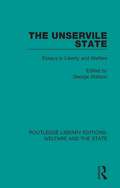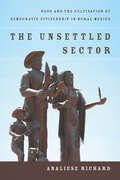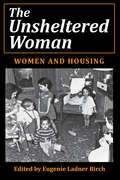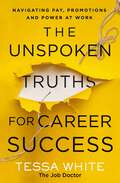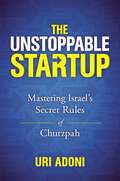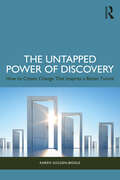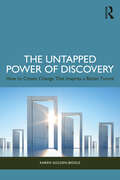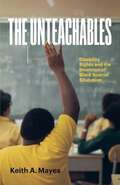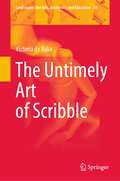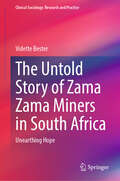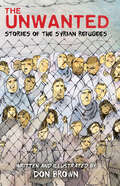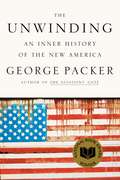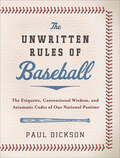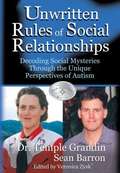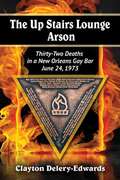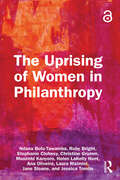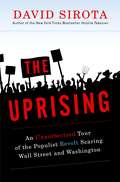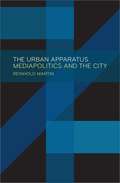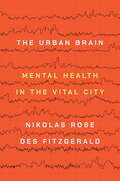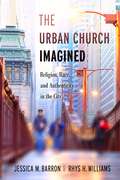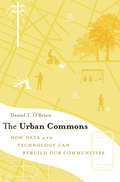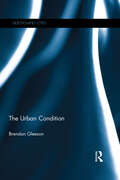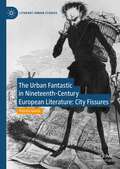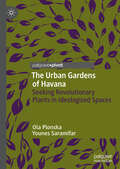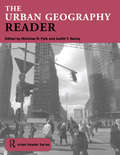- Table View
- List View
The Unservile State: Essays in Liberty and Welfare (Routledge Library Editions: Welfare and the State #23)
by George WatsonOriginally published in 1957, The Unservile State looks at the theme of liberty in the Welfare State. Has it survived Welfare – is it even better for it? What of Parliament and our civil liberties? Does the present state of property distribution, of industry, agriculture and our social services satisfy the Liberal mind? And what would a liberal policy for foreign and Commonwealth affairs be like? These are some of the questions which this book sets out to answer. It is the first full scale study of the attitudes and policies of contemporary British Liberalism.
The Unsettled Sector: NGOs and the Cultivation of Democratic Citizenship in Rural Mexico
by Analiese RichardIn late twentieth century Mexico, the NGO "boom" was hailed as an harbinger of social change and democratic transition, with NGOs poised to transform the relationship between states and civil society on a global scale. And yet, great as the expectations were for NGOs to empower the poor and disenfranchised, their work is rooted in much older civic and cultural traditions. Arguably, they are just as much an accomplice in neoliberal governance. Analiese Richard seeks to determine what the growth of NGOs means for the future of citizenship and activism in neoliberal democracies, where a widening chasm between rich and poor threatens democratic ideals and institutions. Analyzing the growth of NGOs in Tulancingo, Hidalgo, from the 1970s to the present, The Unsettled Sector explores the NGOs' evolving network of relationships with donors, target communities, international partners, state agencies, and political actors. It reaches beyond the campesinos and farmlands of Tulancingo to make sense of the NGO as an institutional form. Richard argues that only if we see NGOs as they are--bridges between formal politics and public morality--can we understand the opportunities and limits for social solidarity and citizenship in an era of neoliberal retrenchment.
The Unsheltered Woman: Women and Housing
by Randall HinshawDefining the "unsheltered woman" and her needs is a complicated task. Regardless of the roots of the condition, a significant number of women are not being housed as well as they could be. Women are not the only victims of an inadequately met housing demand; their families suffer as well. This volume provides sources of information for understanding which women are ill-housed and why their shelter is substandard.Birch reviews basic demographic issues and trends in household formation, using census information to reveal which groups in the country and in New York City have housing problems. The essays then turn to the needs of special groups of women: elderly women, working-class women, and professional women - married and single. Later essays investigate locational and design issues related to women's concerns: a model case study in Denver; high-rise housing in New York City; neighborhood housing for the elderly in Manhattan.The author has gathered together more than twenty of the top professionals in the field including Susan Cotts Watkins, Evelyn S. Mann, May Engler, Roberta R. Spohn, Olivia Schieffelin Nordberg, Barbara Behrens Gers, Susan Saegert, Elizabeth Mackintosh, Gwendolyn Wright, Dolores Hayden, Jacqueline Leavitt, Ronnie Feit, Jan Peterson, Michael Mostoller, Clara Fox, Celine G. Marcus, Jane Margolies, Lynda Simmons, Judith Edelman, Rebecca A. Lee, and Michael A. Stegman. The Unsheltered Woman is significant not only for women, but also for housing policy in America. Until now, very little research has focused on gender policy issues, as such it should be read by all urban planners, policy makers, and housing authorities.
The Unspoken Truths for Career Success: Navigating Pay, Promotions, and Power at Work
by Tessa White"A terrific read for the new generations rising in the workforce—and for their leaders."— Stephen M. R. Covey, The New York Times and #1 Wall Street Journal bestselling author of The Speed of Trust and Trust & Inspire STOP SPINNING YOUR WHEELS AND TAKE CONTROL OF YOUR CAREER FUTURE TODAY.Building a successful career in the world of remote work, hybrid schedules, and a lack of work/life balance is not easy. In fact it&’s difficult and often seems impossible. But, it doesn&’t have to be that way. By confronting the lies we are told about building a career, this book will bring you one step closer to the epiphany that will change your life.This workplace manual lays out the truth behind the lies that are fueling the most common career frustrations, including:The truth about pay. Hard work doesn&’t always lead to more money. Learn how to leverage your position to maximize your salary.The truth about promotions. If you want to be considered for a better job title with better pay, you need to be better than your job description. Understand how to build the skills you need to be considered for a promotion.The truth about loyalty. Companies are not designed to return the loyalty you give them. Stop waiting for the praise you&’ve earned and start focusing on your future.The truth about burnout. Work/life balance doesn&’t have to mean taking a step back. Learn to work with your brain and not against it.The truth about office politics and power. You may hate office politics, but they are in every company in every industry. Learn to use the political landscape of your workplace to your advantage. Master these unspoken truths for greater recognition, increased opportunities for pay and promotions, and to provide a path to greater influence and power. The truth can indeed set you free.
The Unstoppable Startup: Mastering Israel's Secret Rules of Chutzpah
by Uri AdoniTHE BOLD SECRET TO SUCCESSFUL STARTUPSVeteran venture capitalist Uri Adoni shares the secrets to Israel&’s incredible track record of success in this new guide that will help make any startup unstoppable.More than half of all startups fail—often during the crucial early stages of development when they need to prove their viability on a limited budget. But when it comes to startup success, one country stands out: Israel. Even though it is a relatively small country with a population of just over 9 million inhabitants, Israel has one of the highest concentrations of startups in the world, has the highest venture capital per capita, is one of the top countries in terms of number of companies listed on NASDAQ, and is well recognized as a global leader in research and development.In The Unstoppable Startup, Uri Adoni goes behind the scenes to explain the principles and practices that can make any startup, anywhere in the world, become an unstoppable one.Packed with insider accounts from leaders who have realized bold visions, The Unstoppable Startup distills Israeli chutzpah into six operational rules that will help you to:Build an unstoppable team;Foresee the future and innovate to meet its demands;Manage your funding and partnerships through all phases of growth;Dominate the market category you are after or create a new one;Build and manage an early stage investment vehicle; andBuild and grow a healthy high-tech ecosystem.Far from mere conjecture, Adoni implemented these practices throughout his more than 12 years as a venture capitalist for one of Israel's most successful venture funds, and he continues to utilize these same proven startup strategies today in metropolitan areas in the US.
The Untapped Power of Discovery: How to Create Change That Inspires a Better Future
by Karen Golden-BiddleDespite being a game-changer in powering human growth, discovery remains a mystery. How can it produce ahas and insights to meet the challenge of new realities and reimagine organizational management? This book lays out a process of inquiry that drives belief change and leads to discoveries, empowering leaders, groups, and the organization with a powerful tool for navigating an uncertain future. Discovery lights the intellectual spark for every breakthrough in science, technology, pharmaceuticals, and more—but fear and inertia can harden beliefs and practices that no longer fit the new realities. To counter this, discovery can be cultivated rather than suppressed, using a new, three-phase process, a management practice that consistently generates the ahas and insights that underpin all transformation. Based on years of research and real-world observation, this book inspires and equips leaders at all levels to champion this discovery process and fuel genuine, sustained change in their communities and organizations.Accompanied by a website that includes proprietary tools, audio and video clips, and a downloadable workbook, this book is an enriching resource for current and aspiring leaders and managers across industries, as well as management consultants, HR professionals, corporate educators, and business students.
The Untapped Power of Discovery: How to Create Change That Inspires a Better Future
by Karen Golden-BiddleDespite being a game-changer in powering human growth, discovery remains a mystery. How can it produce ahas and insights to meet the challenge of new realities and reimagine organizational management?This book lays out a process of inquiry that drives belief change and leads to discoveries, empowering leaders, groups, and the organization with a powerful tool for navigating an uncertain future. Discovery lights the intellectual spark for every breakthrough in science, technology, pharmaceuticals, and more—but fear and inertia can harden beliefs and practices that no longer fit the new realities. To counter this, discovery can be cultivated rather than suppressed, using a new, three-phase process, a management practice that consistently generates the ahas and insights that underpin all transformation. Based on years of research and real-world observation, this book inspires and equips leaders at all levels to champion this discovery process and fuel genuine, sustained change in their communities and organizations.Accompanied by a website that includes proprietary tools, audio and video clips, and a downloadable workbook, this book is an enriching resource for current and aspiring leaders and managers across industries, as well as management consultants, HR professionals, corporate educators, and business students..
The Unteachables: Disability Rights and the Invention of Black Special Education
by Keith A. MayesHow special education used disability labels to marginalize Black students in public schoolsThe Unteachables examines the overrepresentation of Black students in special education over the course of the twentieth century. As African American children integrated predominantly white schools, many were disproportionately labeled educable mentally retarded (EMR), learning disabled (LD), and emotionally behavioral disordered (EBD). Keith A. Mayes charts the evolution of disability categories and how these labels kept Black learners segregated in American classrooms.The civil rights and the educational disability rights movements, Mayes shows, have both collaborated and worked at cross-purposes since the beginning of school desegregation. Disability rights advocates built upon the opportunity provided by the civil rights movement to make claims about student invisibility at the level of intellectual and cognitive disabilities. Although special education ostensibly included children from all racial groups, educational disability rights advocates focused on the needs of white disabled students, while school systems used disability discourses to malign and marginalize Black students.From the 1940s to the present, social science researchers, policymakers, school administrators, and teachers have each contributed to the overrepresentation of Black students in special education. Excavating the deep-seated racism embedded in both the public school system and public policy, The Unteachables explores the discriminatory labeling of Black students, and how it indelibly contributed to special education disproportionality, to student discipline and push-out practices, and to the school-to-prison pipeline effect.
The Untimely Art of Scribble (Landscapes: the Arts, Aesthetics, and Education #34)
by Victoria de RijkeThis book offers new definitions, vocabularies and insights for “scribbling”, viewing it as a fascinating and revealing process shared by many different disciplines and practices. The book provides a fresh and timely perspective on the nature of mark making and the persistence of the gestural impulse from the earliest graphic marks to the most sophisticated artistic production. The typical treatment of scribbling in the literature of artistic development has cast the practice as a prelude to representation in drawing and writing, with only occasional acknowledgment of the continuing joy and experiment of making marks across many arts practices. The continuous line the author traces between the universal practice of scribbling in infancy and early childhood and the work of radical creativity for contemporary and historical artists is original and clarifying, expanding the range of drawing behaviors to that of avant-garde painters, performance and the digital.
The Untold Story of Zama Zama Miners in South Africa: Unearthing Hope (Clinical Sociology: Research and Practice)
by Vidette BesterThis book results from a decade of in-depth research on the complexities of Zama Zama mining in South Africa, which has become a pressing issue of late. It critiques the overly simplistic portrayal of the miners negatively and as illegal immigrants. Through a sociological lens, this book explores the broader socio-economic conditions, the profound impact of South Africa&’s mining history, particularly the migrant labor system, on today&’s Zama Zama miners, and the role of women in the sector. This book is not just about mining; it interrogates issues around language, poverty, and power. It challenges dominant societal narratives and examines how labels can further marginalize vulnerable groups. Inspired by the works of Pierre Bourdieu and Michel Foucault on classification and language, the book questions who holds the power to label and shape mainstream discourses. Amplifying the voices of the Zama Zamas themselves, the book transforms the conversation around Zama Zama mining in South Africa and beyond, providing fresh insights into this complex and marginalized sector. This book is more than an original and insightful study on informal mining – it offers practical initiatives for businesses, government, and civil society to engage with and address this marginalized sector more sustainably.
The Unwanted: Stories of the Syrian Refugees
by Don BrownSibert Honor Medalist · New York Public Library Best Of 2018 · The Horn Book&’s Fanfare 2018 list · Kirkus Best Books of 2018 · YALSA Excellence in Nonfiction WinnerIn the tradition of two-time Sibert honor winner Don Brown&’s critically acclaimed, full-color nonfiction graphic novels The Great American Dust Bowl and Drowned City, The Unwanted is an important, timely, and eye-opening exploration of the ongoing Syrian refugee crisis, exposing the harsh realities of living in, and trying to escape, a war zone. Starting in 2011, refugees flood out of war-torn Syria in Exodus-like proportions. The surprising flood of victims overwhelms neighboring countries, and chaos follows. Resentment in host nations heightens as disruption and the cost of aid grows. By 2017, many want to turn their backs on the victims. The refugees are the unwanted. Don Brown depicts moments of both heartbreaking horror and hope in the ongoing Syrian refugee crisis. Shining a light on the stories of the survivors, The Unwanted is a testament to the courage and resilience of the refugees and a call to action for all those who read.
The Unwinding: An Inner History of the New America, First Edition
by George PackerA riveting examination of a nation in crisis, from one of the finest political journalists of our generation.<P><P> American democracy is beset by a sense of crisis. Seismic shifts during a single generation have created a country of winners and losers, allowing unprecedented freedom while rending the social contract, driving the political system to the verge of breakdown, and setting citizens adrift to find new paths forward. In The Unwinding, George Packer, author of The Assassins' Gate: America in Iraq, tells the story of the United States over the past three decades in an utterly original way, with his characteristically sharp eye for detail and gift for weaving together complex narratives.<P> The Unwinding journeys through the lives of several Americans, including Dean Price, the son of tobacco farmers, who becomes an evangelist for a new economy in the rural South; Tammy Thomas, a factory worker in the Rust Belt trying to survive the collapse of her city; Jeff Connaughton, a Washington insider oscillating between political idealism and the lure of organized money; and Peter Thiel, a Silicon Valley billionaire who questions the Internet's significance and arrives at a radical vision of the future. Packer interweaves these intimate stories with biographical sketches of the era's leading public figures, from Newt Gingrich to Jay-Z, and collages made from newspaper headlines, advertising slogans, and song lyrics that capture the flow of events and their undercurrents.<P> The Unwinding portrays a superpower in danger of coming apart at the seams, its elites no longer elite, its institutions no longer working, its ordinary people left to improvise their own schemes for success and salvation. Packer's novelistic and kaleidoscopic history of the new America is his most ambitious work to date. <P>National Book Award 2013
The Unwritten Rules of Baseball: The Etiquette, Conventional Wisdom, and Axiomatic Codes of Our National Pastime
by Paul DicksonFrom beanballs to basebrawls, the most important rules governing the game of baseball have never been officially written down—until now.They have no sanction from the Commissioner, appear nowhere in any official publication, and are generally not posted on any clubhouse wall. They represent a set of time-honored customs, rituals, and good manners that show a respect for the game, one's teammates, and one's opponents. Sometimes they contradict the official rulebook. The fans generally only hear about them when one is bent or broken, and it becomes news for a few days. Now, for the first time ever, Paul Dickson has put these unwritten rules down on paper, covering every situation, whether on the field or in the clubhouse, press box, or stands. Along with entertaining baseball axioms, quotations, and rules of thumb, this essential volume contains the collected wisdom of dozens of players, managers, and reporters on the secret rules that you break at your own risk, such as:1.7.1. In a Fight, Everyone Must Leave the Bench and the Bullpen Has to Join In1.13.3. In a Blowout Game, Never Swing as Hard as You Can at a 3-0 Pitch5.1.0. In Areas That Have Two Baseball Teams, Any Given Fan Can Only Really Root For One of Them
The Unwritten Rules of Social Relationships: Decoding Social Mysteries Through the Unique Perspectives of Autism
by Temple Grandin Sean BarronBorn with autism, Sean Barron and Temple Grandin now famously live successful social lives. But their paths were very different. Temple's logical mind controlled her social behavior. She interacted with many adults and other children, experiencing varied social situations. Logic informed her decision to obey social rules and avoid unpleasant consequences. Sean's emotions controlled his social behavior. Baffled by social rules, isolated and friendless, he made up his own, and applied them to others. When they inevitably broke his rules, he felt worthless and unloved. Both Temple and Sean ultimately came to terms with the social world and found their places in it. Whether you are a person with autism, a caregiver in the autism community, or just someone interested in an "outsider" view of society, their powerful stories will enthrall and enlighten you.
The Up Stairs Lounge Arson: Thirty-two Deaths in a New Orleans Gay Bar, June 24, 1973
by Clayton Delery-EdwardsOn June 24, 1973, a fire in a New Orleans gay bar killed 32 people. This still stands as the deadliest fire in the city's history. Though arson was suspected, and though the police identified a likely culprit, no arrest was ever made. Additionally, government and religious leaders who normally would have provided moral leadership at a time of crisis were either silent or were openly disdainful of the dead, most of whom were gay men. Based upon review of hundreds of primary and secondary sources, including contemporary news accounts, interviews with former patrons of the lounge, and the extensive documentary trail left behind by the criminal investigations, The Up Stairs Lounge Arson tells the story of who frequented this bar, what happened on the day of the fire, what course the investigations took, why an arrest was never made, and what the lasting effects of the fire have been.
The Uprising of Women in Philanthropy
by Musimbi Kanyoro Ana Oliveira Helen LaKelly Hunt Ndana Bofu-Tawamba Ruby Bright Stephanie Clohesy Christine Grumm Laura Risimini Jane Sloane Jessica TomlinThe Uprising of Women in Philanthropy tells the inspiring, never-before-told, story of the Global Women’s Funding Movement—considered the women’s movement’s greatest secret—and how it enabled women from all walks of life to harness the power of money to free themselves from oppression.Brimming with feminist epiphanies, this social justice playbook is an urgent call for women’s collective leadership to guide humanity through the gravest of challenges, overcoming patriarchy’s multi-millennium reign through the uprising of women leaders and philanthropists. Founded during the second-wave women’s movement of the early 1970s, small groups of women across the world, independent of each other, had the same epiphany: it will take a movement of women to raise the money needed to fund women’s freedom. Since then, the Global Women's Funding Movement has grown into a global network of radically generous, risk-taking philanthropists who collectively wield financial might to win seismic gender equality victories. The authors document the "Women Effect" that results from gender equality and women’s collective leadership, including improved public health and reproductive justice, expanded public education, stronger democracies, resilient economies, climate recovery and enduring peace. The Global Women's Funding Movement is guided by its Feminist Funding Principles and, through them, it has innovated the most effective philanthropic practices, including trust-based philanthropy.The Uprising of Women in Philanthropy is for those interested in focusing the power of philanthropy on leveraging systemic social justice victories and gender equality gains. The long-practiced Feminist Funding Principles imparted by the authors is a recipe for the feminist alchemy needed to transform society for the betterment of all.
The Uprising: An Unauthorized Tour of the Populist Revolt Scaring Wall Street and Washington
by David Sirota[From the book jacket] An All-Access Pass to the Populist Insurrection Brewing Across the Country Job outsourcing. Perpetual busy signals at government agencies. Slashed paychecks. Stolen elections. A war without end, fatally mismanaged. Ordinary Americans on both the Right and Left are tired of being disenfranchised by corrupt politicians of both parties and are organizing to change the status quo. In his invigorating new book, David Sirota investigates whether this uprising can be transformed into a unified, lasting political movement. Throughout the course of American history, uprisings like the one we are seeing now have given birth to powerful movements to end wars, protect workers, and expand civil rights, so the prospect of today's uprising turning into a full- fledged populist movement terrifies Wall Street and Washington. In The Uprising, Sirota takes us far from the national media spotlight into the trenches where real change is happening - from the headquarters of the most powerful third party in America to the bowels of the U.S. Senate; from the auditorium of an ExxonMobil shareholder meeting to the quasi-military staging area of a vigilante force on the Mexican border. This is vital, on-the-ground reporting that immerses us in the tumultuous give-and-take of politics at its most personal. Sirota also offers a biting critique of our politics. He shows how the uprising is, at its core, a reaction to faux "bipartisanship" in the nation's capital - the "bipartisanship" whereby Republican and Democratic lawmakers join together in putting the agenda of corporate interests above all those of ordinary citizens. Ultimately, Sirota reminds us that the Declaration of Independence, "America's original uprising manifesto," says that governments "derive their powers from the consent of the governed." Irreverent and insightful, The Uprising shows how the governed have stopped consenting and have started taking action.
The Urban Apparatus: Mediapolitics and the City
by Reinhold MartinUrbanization is a system of power and knowledge, and today&’s city functions through the expansive material infrastructures of the urban order. In The Urban Apparatus, Reinhold Martin analyzes urbanization and the contemporary city in aesthetic, socioeconomic, and mediapolitical terms. He argues that understanding the city as infrastructure reveals urbanization to be a way of imparting functional, aesthetic, and cognitive order to a contradictory, doubly bound neoliberal regime.Blending critical philosophy, political theory, and media theory, The Urban Apparatus explores how the aesthetics of cities and their political economies overlap. In a series of ten essays, with a detailed theoretical introduction, Martin explores questions related to urban life, drawn from a wide range of global topics—from the fiscal crisis in Detroit to speculative development in Mumbai to the landscape of Mars, from discussions of race and the environment to housing and economic inequality. Each essay proposes a particular &“mediator&” (or a material complex) that is shaped by imaginative practices, each answering the question &“What is a city, today?&” The Urban Apparatus serves as an &“urban&” bookend to the architectural questions explored by Martin in his earlier book Utopia&’s Ghost, and ultimately offers readers a way to think politically about urbanization.
The Urban Brain: Mental Health in the Vital City
by Nikolas Rose Des FitzgeraldBridging the social and life sciences to unlock the mystery of how cities shape mental health and illnessMost of the world’s people now live in cities and millions have moved from the countryside to the rapidly growing megacities of the global south. How does the urban experience shape the mental lives of those living in and moving to cities today? Sociologists study cities as centers of personal progress and social innovation, but also exclusion, racism, and inequality. Psychiatrists try to explain the high rates of mental disorders among urban dwellers, especially migrants. But the split between the social and life sciences has hindered understanding of how urban experience is written into the bodies and brains of urbanites. In The Urban Brain, Nikolas Rose and Des Fitzgerald seek to revive the collaboration between sociology and psychiatry about these critical questions. Reexamining the relationship between the city and the brain, Rose and Fitzgerald explore the ways cities shape the mental health and illness of those who inhabit them.Drawing on the social and life sciences, The Urban Brain takes an ecosocial approach to the vital city, in which humans live and thrive but too often get sick and suffer. The result demonstrates what we can gain by a vitalist approach to the mental lives of those migrating to and living in cities, focusing on the ways that humans make, remake, and inhabit their urban lifeworlds.
The Urban Church Imagined: Religion, Race, and Authenticity in the City
by Rhys H. Williams Jessica M. BarronExplores the role of race and consumer culture in attracting urban congregants to an evangelical church The Urban Church Imagined illuminates the dynamics surrounding white urban evangelical congregations’ approaches to organizational vitality and diversifying membership. Many evangelical churches are moving to urban, downtown areas to build their congregations and attract younger, millennial members. The urban environment fosters two expectations. First, a deep familiarity and reverence for popular consumer culture, and second, the presence of racial diversity. Church leaders use these ideas when they imagine what a “city church” should look like, but they must balance that with what it actually takes to make this happen. In part, racial diversity is seen as key to urban churches presenting themselves as “in touch” and “authentic.” Yet, in an effort to seduce religious consumers, church leaders often and inadvertently end up reproducing racial and economic inequality, an unexpected contradiction to their goal of inclusivity. Drawing on several years of research, Jessica M. Barron and Rhys H. Williams explore the cultural contours of one such church in downtown Chicago. They show that church leaders and congregants’ understandings of the connections between race, consumer culture, and the city is a motivating factor for many members who value interracial interactions as a part of their worship experience. But these explorations often unintentionally exclude members along racial and classed lines. Indeed, religious organizations’ efforts to engage urban environments and foster integrated congregations produce complex and dynamic relationships between their racially diverse memberships and the cultivation of a safe haven in which white, middle-class leaders can feel as though they are being a positive force in the fight for religious vitality and racial diversity. The book adds to the growing constellation of studies on urban religious organizations, as well as emerging scholarship on intersectionality and congregational characteristics in American religious life. In so doing, it offers important insights into racially diverse congregations in urban areas, a growing trend among evangelical churches. This work is an important case study on the challenges faced by modern churches and urban institutions in general.
The Urban Commons: How Data and Technology Can Rebuild Our Communities
by Daniel T. O'BrienThrough voicemail, apps, websites, and Twitter, Boston’s sophisticated 311 system allows citizens to report potholes, broken streetlights, graffiti, and vandalism that affect everyone’s quality of life. Drawing on Boston’s rich data, Daniel T. O’Brien offers a model of what smart technology can do for cities seeking both growth and sustainability.
The Urban Condition (Questioning Cities)
by Brendan GleesonThis book will speak to the new human epoch, the Urban Age. A majority of humanity now lives for the first time in cities. The city, the highest invention of the modern age, is now the human heartland. And yet the same process that brought us the city and its wonders, modernisation, has also thrown up challenges and threats, especially climate change, resource depletion, social division and economic insecurity. This book considers how these threats are encountered and countered in the urban age, focusing on the issue of human knowledge and self-awareness, just as Hannah Arendt’s influential The Human Condition did half a century ago. The Human Condition is now The Urban Condition. And it is this condition that will define human prospects in an age of default and risk. Gleeson expertly explores the concept through three main themes. The first is an exploration of what defines the current human condition, especially the expanding cities that are at the heart of an over-consumptive world economic order. The second exposes and reviews the reawakening of forms of knowledge (‘naturalism’) that are likely to worsen not improve our comprehension of the crisis. The new ‘science of urbanism’ in popular new literature exemplifies this dangerous trend. The third and last part of the book considers prospects for a new urban, and therefore human, dispensation, ‘The Good City’. We must first journey in our urban vessels through troubled times. But can we now start to plot the way to new shores, to a safer, more resilient city that provides for human flourishing? The Urban Condition attempts this ideal, conceiving a new urbanism based on the old idea of self-limitation. The Urban Condition is an original, timely book that reconsiders and redeploys Arendt’s famous notion of The Human Condition in an age of cities and risk. It brings together several important strands of human consideration, urbanisation, climate threat, resource depletion, economic default and critical knowledge and weaves them into a new analysis of the times. It also looks to a future that is nearly with us—of changed climate, resource scarcity and economic stress. The book journeys into these troubled times, proposing the idea of Lifeboat Cities as a way of thinking about the human journey to come
The Urban Fantastic in Nineteenth-Century European Literature: City Fissures (Literary Urban Studies)
by Patricia GarcíaThe Urban Fantastic in Nineteenth-Century European Literature explores transnational perspectives of modern city life in Europe by engaging with the fantastic tropes and metaphors used by writers of short fiction. Focusing on the literary city and literary representations of urban experience throughout the nineteenth century, the works discussed incorporate supernatural occurrences in a European city and the supernatural of these stories stems from and belongs to the city. The argument is structured around three primary themes. “Architectures”, “Encounters” and “Rhythms” make reference to three axes of city life: material space, human encounters, and movement. This thematic approach highlights cultural continuities and thus supports the use of the label of “urban fantastic” within and across the European traditions studied here.
The Urban Gardens of Havana: Seeking Revolutionary Plants in Ideologized Spaces
by Ola Plonska Younes SaramifarThis book relates stories of everyday life revolving around small-scale urban gardens in Central Havana and focusing particularly on that of Marcelo, a seventy-four-year-old revolutionary and gardener. The urban gardens are contested spaces: though monitored and controlled by Cuban state institutions, they also offer possibilities of crafting life in resistance. The experiences the authors narrate are not ‘thick descriptions,’ linked to larger political issues, but rather rhizomatic observations that highlight the relationships between humans and non-humans within the nature-culture debate. Using these experiences, the authors argue that ‘the political’ reaches beyond the affairs of state and governance and should be seen as an all-encompassing part of life. The authors thereby invite the social sciences to focus on the microscopic and the day-to-day to illuminate how the political affairs of lives can be imagined differently.
The Urban Geography Reader (Routledge Urban Reader Series)
by Judith T. Kenny Nicholas R. FyfeDrawing on a rich diversity of theoretical approaches and analytical strategies, urban geographers have been at the forefront of understanding the global and local processes shaping cities, and of making sense of the urban experiences of a wide variety of social groups. Through their links with those working in the fields of urban policy design, urban geographers have also played an important role in the analysis of the economic and social problems confronting cities. Capturing the diversity of scholarship in the field of urban geography, this reader presents a stimulating selection of articles and excerpts by leading figures. Organized around seven themes, it addresses the changing economic, social, cultural, and technological conditions of contemporary urbanization and the range of personal and public responses. It reflects the academic importance of urban geography in terms of both its theoretical and empirical analysis as well as its applied policy relevance, and features extensive editorial input in the form of general, section and individual extract introductions. Bringing together in one volume 'classic' and contemporary pieces of urban geography, studies undertaken in the developed and developing worlds, and examples of theoretical and applied research, it provides in a convenient, student-friendly format, an unparalleled resource for those studying the complex geographies of urban areas.
